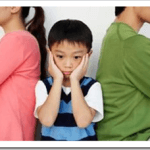Parenting is never easy. The challenges are enormous. Decisions are rarely black and white. How much should you indulge your children? When do you step in on sibling or friend-related battles? How much can you trust other parents watching your child for sleepovers and play dates? How tolerant should you be regarding food and eating issues? When should you step in with discipline? When are you crossing the line with punishment? The questions and decisions are infinite, emotionally challenging and hard to resolve.
All of this is life as usual for parents in a traditional marriage. When you add the component of divorce to the mix, the waters are considerably more muddied. And many divorced parents find themselves in the position of questioning their true motives when faced with parenting decisions.
What about you? Are your behaviors influenced by your feelings about your former spouse? Are you responding based on your child’s best interest – or reacting based on revenge, spite, anger or other “I’ll show them …” validations for “getting even”?
When your child’s wellbeing is at stake, these are questions you need to reflect upon. Your answers can have serious consequences.
Pro-Active Parenting means you make decisions based on the circumstances and how they will directly influence your child. Is this a good parenting decision? Is it protecting my child, supporting their growth, allowing them to learn valuable life lessons without endangering them in the process?
Reactive Parenting comes into play when you make decisions based on reacting to your former spouse instead of acting in the best interest of your child. You are playing “tit for tat” rather than being a pro-active parent. A good question to ask yourself before making any parenting decisions is: Would I have made this same decision on behalf of my child if we were still married?
If you would, then chances are good that you are coming from a place of clarity. If you are being influenced by hurting your ex, getting back at them, creating obstacles for them in accessing or influencing their child, you are likely being a Reactive Parent. Your motives come into question because the best interest of your child often is secondary to competing with or getting revenge against your ex. Sadly, your child is the one most harmed in the process.
When faced with making decisions about holiday activities, summer vacation, attending the school concert or neighborhood soccer game, are you thinking first about how your child would like things to be? Are you seeing the world from their perspective for a while? Are you basing your decision on creating a win-win outcome for your “family” – or trying to wield power over your ex to keep them out of the equation? It’s often easy to justify being rude or uncooperative, too tired or too busy to share the kids with their other parent. But are you remembering who is really being hurt by your behavior?
By practicing Pro-Active rather than Reactive Parenting after your divorce, you are giving your children the best hope for a happier and more positive future. It’s worth the time, the consideration and the awareness about choices you make. You’ll be a better parent in the end. And your child will thank you when they are grown!
* * *
Rosalind Sedacca, CDC is a Divorce & Parenting Coach, Founder of the Child-Centered Divorce Network and author How Do I Tell the Kids about the Divorce? A Create-a-Storybook Guide to Preparing Your Children — with Love. For her free ebook on Post-Divorce Parenting: Success Strategies for Getting It Right! and other valuable resources on divorce and parenting issues, go to: www.childcentereddivorce.com.
© Rosalind Sedacca All rights reserved.





